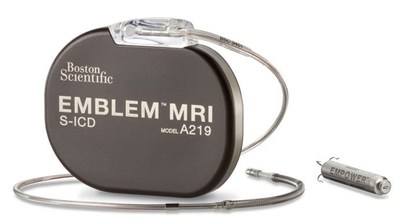Boston Scientific Initiates Trial to Evaluate Industry's First Modular CRM System
Boston Scientific (BSX) has launched the MODULAR ATP clinical trial to assess the safety and efficacy of its mCRM™ Modular Therapy System, integrating the EMBLEM™ MRI Subcutaneous Implantable Defibrillator and the EMPOWER™ Modular Pacing System. This trial will enroll up to 300 patients across 50 centers in the U.S., Canada, and Europe to evaluate the system's complication-free rates, communication success, and pacing thresholds. The S-ICD is shown to prevent sudden cardiac death and has been successfully used in over 100,000 patients, enhancing patient care while minimizing invasive procedures.
- Initiation of MODULAR ATP clinical trial to evaluate innovative mCRM™ Modular Therapy System.
- EMBLEM S-ICD has been implanted in over 100,000 patients, demonstrating credibility and demand.
- Potential to expand patient population benefiting from S-ICD therapy with the EMPOWER MPS.
- None.
Insights
Analyzing...
MARLBOROUGH, Mass., Dec. 2, 2021 /PRNewswire/ -- Boston Scientific Corporation (NYSE: BSX) has initiated the MODULAR ATP clinical trial to evaluate the safety, performance and effectiveness of the mCRM™ Modular Therapy System. The mCRM System consists of two cardiac rhythm management (CRM) devices intended to work together to coordinate therapy: the EMBLEM™ MRI Subcutaneous Implantable Defibrillator (S-ICD) System and the EMPOWER™ Modular Pacing System (MPS), which is designed to be the first leadless pacemaker capable of delivering both bradycardia pacing support and antitachycardia pacing (ATP).
The S-ICD System is a proven treatment option for the prevention of sudden cardiac death and, because it provides protection without touching the heart or substernal space, eliminates many of the complications associated with leads placed in those locations. Recent data from the PRAETORIAN trial comparing the S-ICD to transvenous implantable cardioverter defibrillators (TV-ICDs) confirmed that the S-ICD – which, to date, has been implanted in more than 100,000 patients worldwide – can be the preferred therapy choice for the majority of ICD-indicated patients without a need for pacing.1 Today, patients who may benefit from receiving an S-ICD System are often implanted with a TV-ICD due to the possibility of a future need for bradycardia pacing or ATP – the latter of which is a therapy designed to terminate episodes of fast, abnormal heart rates.
The EMPOWER MPS, which consists of a leadless pacemaker and delivery catheter, is designed to complement the S-ICD System by providing a modular option for patients who develop ATP needs in the future, potentially expanding the patient population that can benefit from S-ICD therapy.
"Since the EMPOWER MPS device can be delivered percutaneously via a minimally invasive approach without the use of leads, the mCRM System could preserve many of the benefits of the S-ICD System while offering an option for patients who subsequently develop a pacing requirement," said Kenneth Stein, M.D., FACC, FHRS senior vice president and chief medical officer, Rhythm Management and Global Health Policy, Boston Scientific. "The components of the system are designed to work in concert with each other, regardless of when implanted, giving physicians the ability to provide personalized patient care today while keeping options open in the future."
The prospective, non-randomized MODULAR ATP clinical trial will enroll at up to 50 centers in the U.S., Canada and Europe up to 300 patients who are guideline-indicated for an ICD or who already have an EMBLEM or EMBLEM MRI S-ICD System implanted. The trial will evaluate the system- and procedure-related complication-free rate of the EMPOWER MPS, the communication success between the EMPOWER MPS and the S-ICD System and adequate pacing capture thresholds of the EMPOWER MPS.
The first patients in the U.S. were enrolled by Daniel J. Cantillon, M.D., FACC, FHRS, Cleveland Clinic. Dr. Cantillon, Reinoud Knops, M.D., PhD, Department of Cardiology, Academic Medical Centre (Amsterdam, Netherlands), Vivek Reddy, M.D., director, Cardiac Arrhythmia Services, Mount Sinai Hospital; and Prof. Lluis Mont, M.D., PhD, FESC, Arrhythmia section head, University of Barcelona are serving as principal investigators of the study.
Preclinical data presented as late-breaking basic science at American Heart Association Scientific Sessions 2021 demonstrated that the mCRM System had excellent performance at up to 18 months, as defined by stable communication between devices, and ability to deliver therapy as intended.
For more information on the MODULAR ATP trial, visit www.bostonscientific.com/mcrm. To learn more about the EMBLEM MRI S-ICD System, visit www.sicdsystem.com.
*The EMPOWER MPS is an investigational device and limited by U.S. law to investigational use only. It is not available for sale. Some device references are for informational purposes only and are pending CE Mark. Not available in the European Economic Area.
About Boston Scientific
Boston Scientific transforms lives through innovative medical solutions that improve the health of patients around the world. As a global medical technology leader for more than 40 years, we advance science for life by providing a broad range of high performance solutions that address unmet patient needs and reduce the cost of healthcare. For more information, visit www.bostonscientific.com and connect on Twitter and Facebook.
Cautionary Statement Regarding Forward-Looking Statements
This press release contains forward-looking statements within the meaning of Section 27A of the Securities Act of 1933 and Section 21E of the Securities Exchange Act of 1934. Forward-looking statements may be identified by words like "anticipate," "expect," "project," "believe," "plan," "estimate," "intend" and similar words. These forward-looking statements are based on our beliefs, assumptions and estimates using information available to us at the time and are not intended to be guarantees of future events or performance. These forward-looking statements include, among other things, statements regarding our business plans and product performance and impact. If our underlying assumptions turn out to be incorrect, or if certain risks or uncertainties materialize, actual results could vary materially from the expectations and projections expressed or implied by our forward-looking statements. These factors, in some cases, have affected and in the future (together with other factors) could affect our ability to implement our business strategy and may cause actual results to differ materially from those contemplated by the statements expressed in this press release. As a result, readers are cautioned not to place undue reliance on any of our forward-looking statements.
Factors that may cause such differences include, among other things: future economic, competitive, reimbursement and regulatory conditions; new product introductions; demographic trends; intellectual property; litigation; financial market conditions; and future business decisions made by us and our competitors. All of these factors are difficult or impossible to predict accurately and many of them are beyond our control. For a further list and description of these and other important risks and uncertainties that may affect our future operations, see Part I, Item 1A – Risk Factors in our most recent Annual Report on Form 10-K filed with the Securities and Exchange Commission, which we may update in Part II, Item 1A – Risk Factors in Quarterly Reports on Form 10-Q we have filed or will file hereafter. We disclaim any intention or obligation to publicly update or revise any forward-looking statements to reflect any change in our expectations or in events, conditions or circumstances on which those expectations may be based, or that may affect the likelihood that actual results will differ from those contained in the forward-looking statements. This cautionary statement is applicable to all forward-looking statements contained in this document.
CONTACTS:
Laura Aumann
Media Relations
(651) 582-4251 (office)
Laura.Aumann@bsci.com
Lauren Tengler
Investor Relations
(508) 683-4479
BSXInvestorRelations@bsci.com
1 Knops, R. E. et al. Subcutaneous or transvenous defibrillator therapy. N. Engl. J. Med. 383, 526–536 (2020)
![]() View original content to download multimedia:https://www.prnewswire.com/news-releases/boston-scientific-initiates-trial-to-evaluate-industrys-first-modular-crm-system-301436019.html
View original content to download multimedia:https://www.prnewswire.com/news-releases/boston-scientific-initiates-trial-to-evaluate-industrys-first-modular-crm-system-301436019.html
SOURCE Boston Scientific Corporation








